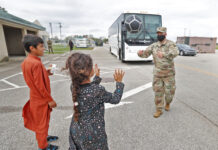MEXICO CITY — Prosecutors in the northern Mexico border state of Sonora said Monday tests have confirmed that a badly decayed corpse is that of an Indigenous rights leader who disappeared almost four weeks ago.
The office said DNA tests and fingerprints were used to identify Tomás Rojo Valencia, a leader of the Yaqui indigenous community. His body was found last week near the Yaqui town of Vicam, Sonora.
Rojo Valencia disappeared May 27 following tensions over Yaqui roadblocks protesting gas ducts, water pipelines and railway lines that have been run across their territory without consulting them or giving them much benefit. Rojo Valencia served as the Yaquis’ spokesman during past conflicts over land and water rights.
The confirmation came on the same day a 25-year-old Yaqui woman was reported missing after she left her home in Vicam to go to work, but never arrived. She was last seen June 17.
President Andrés Manuel López Obrador has made it his special project to bring justice to the Yaquis, who he has described as Mexico’s most persecuted Indigenous group.
In February, the conflict over the highway blockades came to a head with the death of an Indigenous man killed when a trucker plowed through a Yaqui roadblock, hitting a member of the group.
Businessmen and truckers in Sonora state complain the roadblocks seriously affect the movement of raw materials and export goods, and said protesters are sometimes abusive or demand money to allow them to pass.
Perhaps best known abroad for the mystical and visionary powers ascribed to them by writer Carlos Castaneda, the Yaquis stubbornly fought the Mexican government’s brutal campaign to eliminate the tribe in the late 1800s and early 1900s.
But they were largely defeated by 1900, and dictator Porfirio Diaz began moving them off their fertile farmland to less valuable territory or to virtual enslavement on haciendas as far away as the far eastern state of Yucatan.
In 2020, López Obrador traveled to Yaqui territory for the establishment of the Justice Commission for the Yaqui People, and he has said he plans to offer an apology on behalf of the government for the genocidal war carried out against them.
The commission has promised housing, development projects and a greater voice for the impoverished Yaqui communities, but some Yaquis aren’t participating in the talks and the agreement has not quelled the protests, which sometimes demand large compensation payments.



